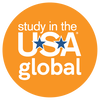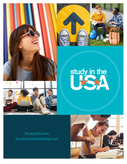|
Revisit this webinar that was held by Careers360 on Wednesday, May 27, for students in India and their parents. The subject is "To Go or Not To Go? The Dilemma of Study Abroad Aspirants." Panel members included Study in the USA's CEO + Publisher, Renait Stephens, Karl Anderson of the University of Arkansas, and Dennix Averion of George Mason University in Virginia. Be Informed, Be Flexible, and Keep Your Dream Alive
In an informative, hour-long webinar, produced by Careers 360 and driven by a compilation of questions from its CEO and Founder Maheshwer Peri, panelists included Study in the USA CEO and Publisher Renait Stephens, Asst. Director Dennix Averion of George Mason University (GMU), and Asst. Director Karl Anderson of University Arkansas (UA). Many of the questions and answers revealed the complexity students now find themselves grappling with during the worldwide pandemic. According to PIE, 76% of Indian students still want to study abroad in 2020. Given this desire, Maheshwer Peri came ready with questions and topics from students ranging from rescinding scholarships, refunding money, deferring, to how to select institutions that are financially solvent. What about extended deadlines or if part of school is canceled? Averion stated students can defer. At GMU all options are on the table, including looking at a late start. GMU’s decisions are informed by government and state policies. Averion advises to ask each university what deferral would look like. Anderson added that undergraduate and graduate programs are organized differently, so whereas grads might have an annual intake, undergraduate students might enroll on a semester or even rolling admissions. Therefore, deferring might look different depending on your educational level. And, with schools encountering financial issues, how do students select a school that will be solvent? According to Stephens, with more than 4,000 U.S. universities to choose from, students need to check accreditation, history, and reputation, and put in the time to research each institution they are interested in attending. What about starting your studies in India and then transferring to the U.S.? In another line of questioning, Maheshwer asked if it’s wise to stay in India, initially starting at an Indian university and then transferring to a U.S. university. Anderson emphatically said yes, if you’re admitted, start at an Indian institution, then transfer in the spring. Or, if you really want the full student experience, such as freshman orientation and being in an entirely new situation, then wait. Averion reminded students that they have the power and control to study abroad, and perhaps the best practice is to wait and see if there’ll be more certainty. Keep your dreams alive Encouraging the hundreds of students in the webinar, Anderson expressed to the students to “Look at options, don’t let dreams die and don’t give up.” Both admissions officers reiterated to reach out to the admissions office and ask questions. Averion stated that GMU’s approach has been to focus on how it can make the student experience safe and healthy. Giving students descriptive actions about what GMU’s policies will look like, Averion listed actions such as 60-minute wait time in between classes to clean and sanitize each room, following guidelines like wearing masks, and changing the occupancy in classrooms. As a good reminder to students and the world, to those 18 years old encountering the pandemic and are eager to study abroad and experience all the world has to offer them, Stephens reminded everyone, “While the world is impacted, hopefully in 4 years we will be in a different situation. What we’re still looking at are students who still want to study abroad.” In summary, Meheshwar articulated the advantages of studying abroad are not changing. Integrating into a new culture, finding ways to innovate, being a global citizen, and expanding your perceptions of your world and then bringing it back to your country and career make it all worth the wait. Flexibility is another characteristic of lessons learned when studying abroad. Whether students realize it or not, their resilience and ability to deal with uncertainty today has started their educational journey and will benefit each of them long after the pandemic is over. |
|
Our sites
StudyUSA.com EnglishCoursesUSA.com CommunityCollegesUSA.com BoardingSchoolsUSA.com StudyintheUSAGlobal Blog © 2021 Study in the USA Global. All Rights Reserved
|
|


